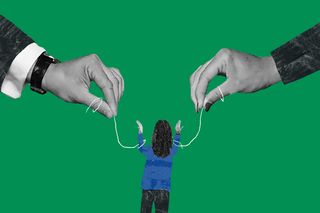
Impulsive, Indecisive Adults Were Probably Raised By Controlling Parents, Says Research
Overprotective parenting involves excessive control, sheltering, and restricted autonomy — catalyzing indecisiveness and impulsiveness.

Once, as kids, a neighbor and I ended up hanging out for about 10 hours, at a stretch. There was an event in our neighborhood that afforded us the rare opportunity to step away from our respective sets of controlling parents, and gossip through the day. When her parents found out, they laughed as they told my parents that it’s a clear case of “baandha goru chhaara peyechhe.” This phrase, used commonly in Bangla, refers to an otherwise tied-up cow experiencing freedom, for a change, and not knowing how to handle it. A growing body of research suggests that’s the case with most individuals exposed to controlling parenting styles in their childhoods.
Parenting styles play a significant part in shaping an individual’s development — impacting their cognitive, emotional, and behavioral patterns. These, in turn, dictate how the individual fares in academics and their careers, how they conduct themselves in a multitude of social relationships, how their self-esteem develops, and the kind of mental health they grow up to have. Of course, given the myriad permutations and combinations in parenting styles, coupled with a child’s external environment and innate neuropsychology, there’s no exhaustive reference book to follow when it comes to figuring out the “right way” to parent. However, what consistently emerges as a “wrong way” to parent is the overprotective, controlling style — also known, in common parlance, as “helicopter parenting.”
“Helicopter parenting behavior we saw included parents constantly guiding their child by telling him or her what to play with, how to play with a toy, how to clean up after playtime and being too strict or demanding,” Nicole Perry from the University of Minnesota, who led a 2018 study on how intensely hands-on and highly involved parenting impacts children, noted.
The study concluded that helicopter parenting inhibits a skill critical to success: self-control, with Perry adding: “Our findings underscore the importance of educating often well-intentioned parents about supporting children’s autonomy with handling emotional challenges.” Overprotective parenting involves excessive control, sheltering, and restricted autonomy, limiting children’s opportunities for independent decision-making and problem-solving — catalyzing indecisiveness.
Related on The Swaddle:
How Being Guilt‑Tripped by Parents, Partners Can Leave Long‑Term Mental Scars
As an article by the Michigan State University states, “The greatest drawback of the overprotective parenting style is underprepared children.”
Further, when parents micromanage their children’s lives and make decisions on their behalf, it suppresses children’s autonomy — leading to increased dependence and impulsivity even upon reaching adulthood since they struggle to make independent choices and often act impulsively, seeking instant gratification without considering long-term consequences. This results in individuals who are both impulsive and indecisive — a heady combination that can significantly impair one’s decision-making abilities, and impact their careers, relationships, and even finances.
Not only that, but often, individuals whose autonomy was restricted during childhood develop a rebellious streak in adulthood — in a desperate bid to regain a sense of control and independence. This can result in impulsive decision-making as a means of asserting autonomy — albeit in a counterproductive manner.
“Many of the consequences [parents] are trying to prevent — unhappiness, struggle, not excelling, working hard, no guaranteed results — are great teachers for kids and not life-threatening. It just feels that way,” Dr. Deborah Gilboa, a family physician and resilience expert, explains. “Failure and challenges teach kids new skills, and, most importantly, teach kids that they can handle failure and challenges.”
Related on The Swaddle:
Self‑Sacrifice Isn’t Always Noble — Sometimes, It’s Weaponized to Manipulate Friends, Family
Otherwise, a child grows up with the impression that their parents don’t trust them to make decisions, which, in turn, makes them believe they’re incapable and takes a toll on their confidence; this is precisely how controlling parents undermine their children’s sense of competence and problem-solving abilities As a consequence, individuals may develop a mindset of “learned helplessness” — becoming indecisive when faced with choices, not just because of a lack of experience and practice, but because they have little faith in themselves.
In a number of Asian cultures — including Indian — this is particularly common. “Our tradition of joint family living can make Indian families particularly vulnerable to enmeshed parenting, as the arrangement can enable too-close involvement and control over children’s lives long into adulthood,” Sonali Gupta, a practicing clinical psychologist, had written in The Swaddle. The fact that nuclear families are rising in the country, doesn’t entirely solve this either; people might still follow the parenting styles they were exposed to as kids, since that blueprint is the one they have the best access to. In addition, as Gupta points out, “[T]he risk of enmeshment is high in a culture that tends to value the sanctity of family over individual happiness.”
Moreover, traditionally in India, parents believe they have a right to dictate their grown-up kids’ choices, too — from dictating career choices to selecting their respective spouses for them. So, the learned helplesness that an individual might develop as a result of growing up with helicopter parents, isn’t just normalized but also encouraged. Movies like Baghban (2003) and Kabhi Khushi Kabhie Gham (2001) — that condition us to worship our parents and treat their commands like divine laws — entrenches the practice further.
Devrupa Rakshit is an Associate Editor at The Swaddle. She is a lawyer by education, a poet by accident, a painter by shaukh, and autistic by birth. You can find her on Instagram @devruparakshit.
Related


Sizzle This: We Should Watch Oppenheimer Too, Actually
